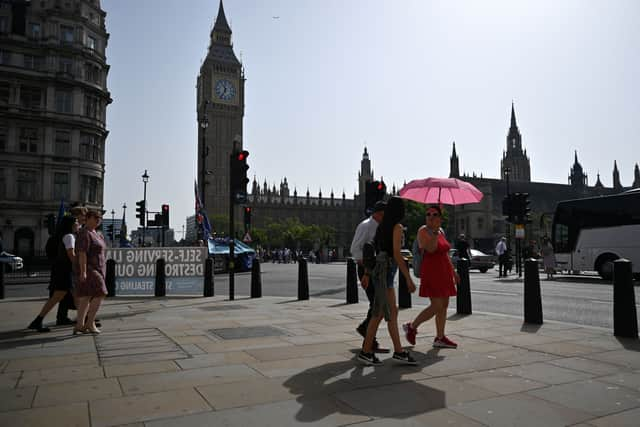UK heatwave: Saturday likely to be hottest day of 2023, according to Met Office - when will temperatures drop?
and live on Freeview channel 276
September’s delayed heatwave is likely to peak this weekend with temperatures set to soar as high as 33C in London, according to the Met Office. Forecasters say Saturday (September 9) it is likely to be the hottest day of the year - beating the previous 2023 record at 32.2C.
An amber heat warning issued by the UK Health Security Agency (UKHSA) for most parts of England is set to remain in place until Sunday evening (September 10) at 9pm. It means that impacts are likely to be felt across the health service, with those aged above 65 or those with pre-existing respiratory or cardiovascular disease at greater risk, - potentially putting more stress under the NHS.
Advertisement
Hide AdAdvertisement
Hide AdWednesday (September 6) was the hottest September day since 2016 with Kew Gardens, London reaching 32C. Temperatures will rise even higher over the coming days, and are likely to exceed the current UK top temperature of 2023 which stands at 32.2C.
The heatwave has been sparked by tropical storms pushing a high pressure system over the UK, with the jet stream having moved to the north and bending into what is known as an “omega blocking pattern”. Temperatures have risen this high before in September in the past - but it is unusual for the heat to last so long, with the Met Office predicting five to six days above 30C for some areas of the UK.


Met Office chief meteorologist Neil Armstrong said: “An active tropical cyclone season in the North Atlantic has helped to amplify the pattern across the North Atlantic, pushing the jet stream well to the north of the UK, allowing some very warm air to be drawn north. It’s a marked contrast to the much of meteorological summer, when the UK was on the northern side of the jet stream with cooler air and more unsettled weather.”
When will the heatwave end?
The September heatwave is expected to last throughout this week and over the weekend before temperatures start dropping off again. However, the Met Office has predicted above average temperatures could be here to stay throughout the month.
Advertisement
Hide AdAdvertisement
Hide AdThey write: “Some uncertainty surrounds the specifics of the forecast for mid-to late September. But it is possible that the end of the month may be slightly drier than usual as there are indications for more high pressure affecting the country than normal.”
However, periods of rain and showers are possible as we move through mid to late September, particularly in the North.
How can I keep safe in the heatwave?
Forecasters have urged people to prioritise their physical health in the heatwave. Here are some tips are keeping healthy:
How to stay safe in the sun:
- Keep out of the sun at the hottest time of the day, between 11am and 3pm
- Exercise when it is cooler such as the morning or evening
- Keep your home cool by closing windows and curtains in rooms that face the sun
- Cover up with suitable clothing such as an appropriate hat and sunglasses
- Wear sunscreen
- Drink plenty of fluids and limit your alcohol intake
- Check on family, friends and neighbours who may be at higher risk of becoming unwell, and if you are at higher risk, ask them to do the same for you
If you suspect someone has heat exhaustion, move them to a cool place and remove unnecessary clothing like a jacket or socks. Symptoms of heat exhaustion, according to the NHS, include tiredness, dizziness, headaches, feeling sick or excessive sweating, as well as limb cramps and a high temperature.
Comment Guidelines
National World encourages reader discussion on our stories. User feedback, insights and back-and-forth exchanges add a rich layer of context to reporting. Please review our Community Guidelines before commenting.
